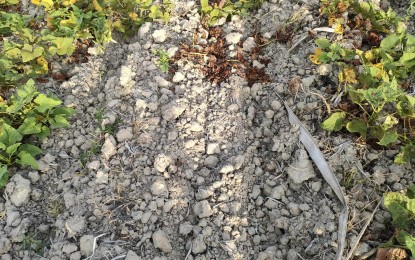
RUINED HARVEST. A dried-up potato farm in the municipality of Mansalay, Oriental Mindoro is seen here on Monday (March 11, 2024). The Municipal Agriculture Office said that about 70 percent of the town's crops have been destroyed by the dry spell. (Photo courtesy of Jemalie Fajutnao)
CALAPAN CITY, Oriental Mindoro – An estimated 70 percent of crops in Mansalay town in this province have been lost to El Niño and the municipal government has admitted that farmers here need logistical support from national agencies to pull through the crisis.
This was gleaned after the town’s Municipal Disaster Risk Reduction and Management Council (MDRRMC) held a crucial meeting with barangay officials on Monday, where an honest-to-goodness assessment was made on the dry spell’s impact on the agricultural sector.
In an interview, Mansalay municipal agriculturist Jemalie Fajutnao said the meeting with village leaders was called because town authorities were struggling to find solutions to the drought, which last week put the town under a state of calamity.
“According to government guidelines, a state of calamity can be declared once damage to crops reaches 30 percent. In our case, 70 percent of crops are ruined. We found out in this morning’s meeting that crops in seven barangays are totally destroyed with no chance of being saved,” he told the Philippine News Agency in Filipino.
Fajutnao disclosed that it became apparent during Monday’s meeting that the municipality would be seeking help from the Department of Social Welfare and Development (DSWD), and even the Senate, to feed the town’s agrarian families who suddenly found themselves without crops to eat or sell.
The municipal government is counting on the DSWD and some lawmakers to send food packs and other essentials to the town’s needy farmers.
He said out of Mansalay’s 17 barangays, only two, Santa Brigida and Balugo, have been relatively unscathed by the dry spell.
The municipal agriculturist explained that the two lucky villages source their irrigation from the Bongabong River, which has continued to supply farms there with water despite the drought.
In the case of Barangay Belugo, farmers had the foresight to plant their crops early, allowing them to harvest their produce before the dry spell took a firm hold over the town.
Fajutnao recalled that El Niño set in rather abruptly in Mansalay, and in neighboring Bulalacao town, because even as late as Jan. 5 this year, the towns were still experiencing strong rains.
“The drought hit us suddenly. All of a sudden, the ground dried up, and it got very hot. Even as late as 4 p.m. the heat still hurts the skin,” he added.
The municipal agriculturist further added that efforts by the Bureau of Fire Protection (BFP) to help water some farms are seemingly in vain because of the sheer expanse of the area that must be irrigated, and because many of the plantations are unreachable to fire trucks.
He also disclosed that representatives of the National Irrigation Administration (NIA) took part in the meeting on Monday to discuss alternatives to irrigating Mansalay's parched plantations.
The greater part of the town’s expected rice harvest has been destroyed, and even high-value crops, such as avocados, potatoes, kamote (sweet potatoes), ube (purple yams), among others, have been ruined by the drought, the official said.
He noted that only mango trees have proven resilient against the heat and lack of water. (PNA)
